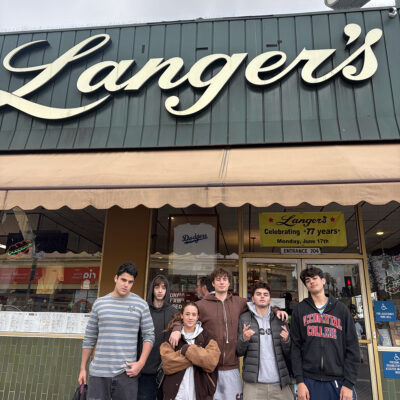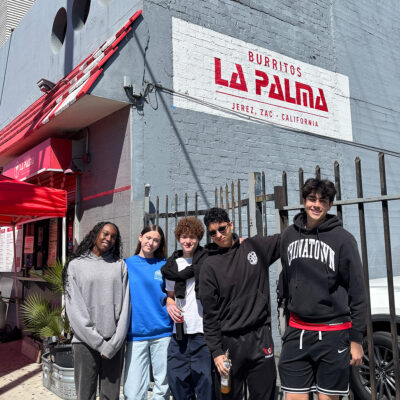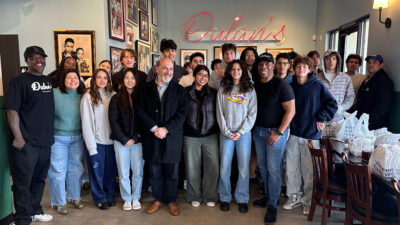Inspired by the late food critic Jonathan Gold, students set out to explore Los Angeles through its diverse culinary landscape, tracing the ways migrant communities have shaped the city’s food culture. By visiting restaurants, engaging with local chefs, and studying the intersection of migration and cuisine, they gain deeper insight into the stories behind each dish—and, in turn, the experiences of those who create them. As Teddy explains, “I like to think of this class as a course that’s really about identity and history and understanding Los Angeles. The food is the mechanism by which we do that.”
For Abbey ‘26, Migrant Foodways was an experience in cultural discovery. Abbey shares that food has always been an essential part of her identity. “I’ve been more drawn to the cultural side—it’s a good chance to explore different cultures and see how food ties into it.” As a Korean-American, she reflected on how the meals her parents make, often based on Korean traditions, help her reconnect with her roots and deepen her awareness of her culture. According to Abbey, the most eye-opening aspect of the course has been uncovering the history behind LA’s food culture. “We went to Boyle Heights for tacos, but before that, we watched a film about the history of the area, how diverse it’s been, and how it was affected by the construction of the freeways,” she explained. “The history was the most surprising part because it’s often overlooked.” This emphasis on history adds a layer of context to the culinary exploration, transforming meals and restaurants into stories of cultural resilience and transformation.
Jasmine’s ‘25 experiences in this course expanded her culinary world. “My parents are Mexican, and it plays a huge role in my life. I mainly eat Mexican food, so it’s been amazing to experience and taste other cuisines,” she shared. “For example, we just tried Japanese food in Torrance, and it was my first time trying raw salmon or sushi. I enjoyed getting outside of my comfort zone and trying new foods. It made me realize that food is not just about eating and being nutritious, but about history, culture, and generations of tradition.”
Jackson ‘25, saw Migrant Foodways as an opportunity to engage more deeply with LA’s food culture. “Not a lot of people think about the food that they’re eating and the history behind it,” he explained. “I thought it was interesting to get a deeper sense of our day-to-day lives of eating and the cultural significance behind it.” He was particularly struck by hidden gems in neighborhoods like Boyle Heights, where unassuming taco stands turned out to be some of the best meals he had ever had. “Some of these places are Michelin-star approved or Jonathan Gold-endorsed, and you’d never know just by looking at them.”
The course also deepened students’ understanding of the role food plays in shaping personal and cultural identity. “Growing up with mixed parents, I experienced two different kinds of cuisines,” Jackson shared. “With my dad, we ate a lot of soul food and southern dishes. My mom’s side is English and German, so we had that influence, too. Food has always been a part of me, and I love that it brings people together in a way few other things can.”
“It gives us a chance for everybody to sit down at a table and talk—whether that’s noticing something about a place we’re in, reflecting on an experience, or being surprised by what we’re tasting. If food is culture, then it’s also incredibly democratic.” – Teddy Varno
For Townsend ‘25, the course revealed how food can provide comfort and hope, especially for migrant communities. After several students interviewed a Greek Orthodox woman at a church in Los Angeles, he reflected on how she spoke about Greek food as a symbol of resilience. “She told us about how she got bullied at school for being an immigrant, but when she ate Greek food with her brother, it gave her something to look forward to. It was an anchor to her identity.”
Ultimately, the Migrant Foodways course has expanded students’ perspectives on how food and migration are deeply interconnected. Teddy Varno sees food as a way to create meaningful dialogue. “It gives us a chance for everybody to sit down at a table and talk—whether that’s noticing something about a place we’re in, reflecting on an experience, or being surprised by what we’re tasting. If food is culture, then it’s also incredibly democratic.”
As these students continue their exploration of Los Angeles, they carry with them a newfound appreciation for the stories woven into every meal. Whether through a family-owned mochi shop, a bustling market in Torrance, or a taco stand in Boyle Heights, their journey through migrant foodways has shown them that food is more than sustenance—it is history, identity, and connection.




